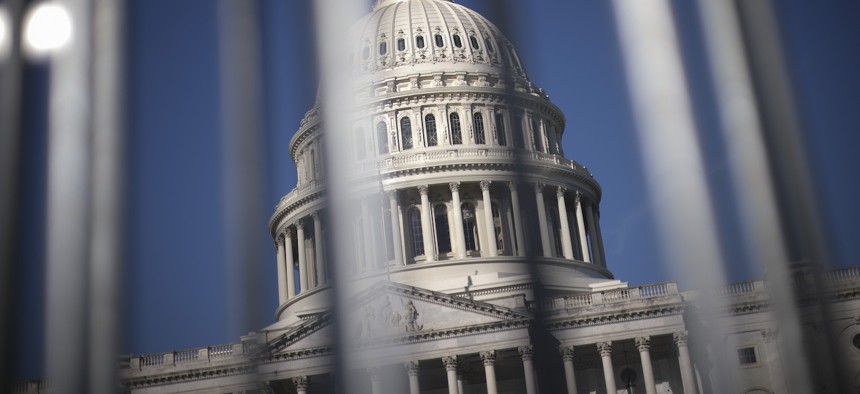
The REINS Act would require every new major rule proposed by federal agencies to be approved by both the House and Senate before taking effect. Win McNamee/Getty Images
The White House Threatens Vetoes Over Regulations Bills
The House is scheduled to vote on these bills this week, but so far has failed to pass the initial procedural measure.
The White House threatened on Tuesday to veto two Republican-backed bills that take aim at the administrative state and rulemaking process.
The Regulations from the Executive in Need of Scrutiny Act, which has the support of 183 House Republicans, would require every new major rule proposed by federal agencies to be approved by both the House and Senate before taking effect. It would also preserve Congress’ ability to disapprove a non-major rule through a joint resolution.
“Congress has explicitly charged federal agencies with the responsibility and the authority to act, but the REINS Act of 2023 would undermine agencies’ efforts by inserting into the regulatory process an unwieldy, unnecessary, and time-consuming hurdle that would prevent implementation of critical safeguards that protect public safety, grow our economy, and advance the public interest,” said a statement of administration policy from the Office of Management and Budget, threatening a veto.
Meanwhile, Rep. Kat Cammack, R-Fla., said upon introducing the bill in January, “the REINS Act is a core part of House Republicans' mission to reintroduce government accountability and to restore Congress' role to check the regulatory actions of federal agencies.” The House is scheduled to vote on this bill on Thursday.
The Separation of Powers Restoration Act, would allow the courts to review agency actions without giving deference to an agency’s interaction of a statute or regulation. This is known as the Chevron Deference, which the Supreme Court said last month it would hear challenges to.
“This bill would undermine separation of powers, a fundamental element of our government, by attempting to jettison long standing principles concerning judicial review of agency interpretation and implementation of laws and regulations,” said OMB, with another veto threat. “Agency interpretations that have been upheld under these principles have promoted economic growth, clean air and water, safe and healthy food, civil rights, public safety, crime reduction, wage increases, lowering costs, and safe working conditions.” The House is scheduled to vote on this legislation Wednesday.
Additionally, on June 6 and 7, the House is scheduled to vote on two measures that would prevent gas stoves from being banned, which became a major Republican concern earlier this year.
This came after a commissioner of the Consumer Product Safety Commission floated the idea of a ban of gas stoves in an interview with Bloomberg, which he and the agency later clarified was not going to happen. However, some cities and states have moved to ban or limit gas stoves for environmental purposes.
“While the administration has been clear that it does not support any attempt to ban the use of gas stoves, it strongly opposes H.R. 1615 and H.R. 1640,” said a statement of administration policy. Both “would undermine science-based Consumer Product Safety Commission decision-making and block common sense efforts to help Americans cut their energy bills.”
As of late Tuesday afternoon, the House failed to pass the combined rule for these four bills, which is the procedural step before voting on them. Several reporters pointed out online this is the first time since 2002 the House has failed to adopt a rule.







